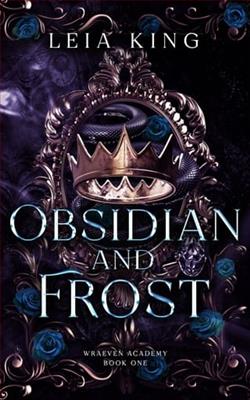Page 91 of Twisted Addiction
Chapter 21
DMITRI VOLKOV
The study tasted of old paper and iron.
Moonlight slanted through the tall windows and cut across the mahogany, turning the scattered documents into islands of pale glare.
My hands were clenched so tight the knuckles were white; the wood beneath them trembled with the pulse I could not make still.
Giovanni stood in the doorway like a man who’d swallowed his fear and decided to wear it.
His scarred face was too calm for the words he brought.
“It’s been two days, boss,” he said. “She won’t eat. She refuses to take the food I leave. You have to release her.”
No. The word rose from a place that had nothing to do with reason. It sat in my throat like a flavored poison and tasted of satisfaction.
“I said no,” I said, and the desk answered my voice with a ripple of scattered papers. “You think I don’t know what hunger is? I know it better than anyone. And I’m not done. I haven’t even begun to break her the way I want.”
Giovanni’s jaw tightened.
He’d been pleading for hours.
“Boss,” he snapped, jaw clenched. “You can punish her, but you can’t kill her. She just had an abortion—she needs care, not acell. Locking her in the dark—she could haemorrhage. This isn’t punishment. It’s murder.”
His words snapped like a thin twig beneath my boot.
I stood because the room couldn’t hold the storm inside me when I stayed seated.
My shadow stretched over him, long and familiar.
“Murder?” I barked. “She pointed a gun at me, Giovanni. She shot me. Do you think I don’t remember the crack? Do you think I don’t remember feeling my blood warm the inside of my sleeve?” My voice was low, but every syllable cut. “If anyone else had pulled that trigger they’d be dead. She’s alive because I chose it.”
He flinched at the truth, then straightened, voice low and urgent.
“She’s your wife — and by all rights your property,” Giovanni said, voice rough where it might have gone soft. “Aren’t you supposed to care for her? Because this... this isn’t care.”
The words were reckless; he knew exactly where they would land.
“You say you hate her, but you bled to keep her safe. You took a man’s hand when he assaulted her at La Sirena. You threatened to kill me for daring to look at her the wrong way. You risked your life going to that Bellanti meeting to force a truce for her, and you tore up the Odessa shipment to buy silence so the Orlovs couldn’t move on her.”
“You let her sleep on a multimillion contract that could’ve burned this whole empire to the ground,” Giovanni snapped. “She was lying right there—on the papers—and you told me to let her rest. You’d rather lose millions than wake her up. Then you hired fighters from five countries to guard her every step. You call that hate? No, boss. That’s the kind of devotion that ruins men.”
“She didn’t just defy you — she violated your rules and desecrated that cathedral,” Giovanni said, voice hard as flint. “I understand the need for punishment. But this”—he gestured toward the heavy door—“locking her in a dark cell that even the devil wouldn’t pray to enter is not punishment. It’s a sentence.” He swallowed. “Order her released, boss. I know you hate that she’s there. Let us find a punishment that keeps you in control without burying her alive.”
His words scraped at me like sand across glass.
I remembered the boy who hadn’t yet learned how to make a life out of vengeance—how memory had been a dull ache rather than an engine.
He’d loved with a purity that had been half pity and half miracle.
That boy existed like a photograph in a drawer: faded edges, impossible to rescue.
What I’d become was the arithmetic of what had been taken from me—my mother’s skull on a hill, my father never known, the Romanos’ neat, smiling faces that hid knives.
Penelope’s family had a ledger written in blood and I had been balancing it my whole life.
Giovanni moved his weight from one foot to the other, trying to look like a man whose patience had a limit. “She bled out after the procedure,” he said, quieter. “She’s weak. Starving her won’t prove anything but an ugly corpse.”















